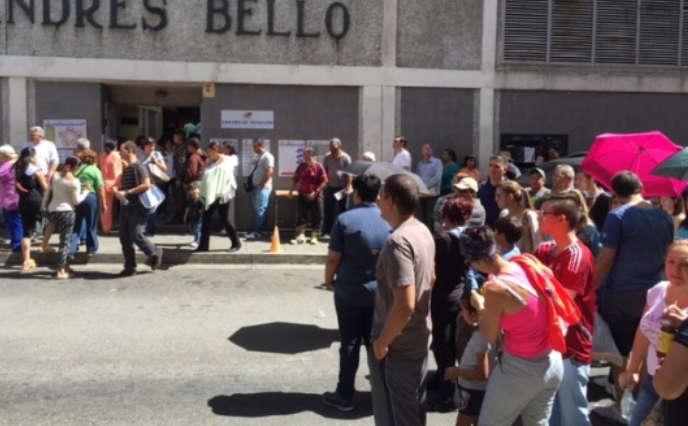Although the complete results of Venezuela’s December 6 legislative elections haven’t yet been released, the announcement that the opposition Democratic Unity Roundtable (MUD) has landed at least 99 seats in the National Assembly has been met with a wide array of responses. In Venezuela and abroad, governments and officials both sympathetic to Chavismo and otherwise have recognized the opposition victory, and congratulated the country on a successful exercise in democracy.
The first, and most notable, to do so was Venezuelan President Nicolas Maduro. When the National Electoral Council (CNE) issued the first wave of results at around 12:30am Caracas time, the president appeared on a nationwide cadena to recognize their validity. While he called the day a “triumph” for Venezuelan democracy, he also blamed it on what the government has framed as an “economic war,” and assured Chavista supporters that it would be only a temporary setback.
Maduro’s announcement deserves some recognition. His administration knew this election would likely hurt it, yet he has publicly accepted the consequences in the way any democratic leader should. As David Smilde notes, the statement “should give pause to those who, over the past year, have confidently asserted that the elections wouldn’t happen, or that the government wouldn’t recognize the results.”
The MUD, for its part, has also applauded the elections, and the MUD leadership has even boldly proclaimed that it will receive an absolute two-thirds majority of 113 representatives. This would, as noted in a previous post, give them the authority to call a recall referendum on Maduro and remove Supreme Court justices, among other things.
In the hours that followed the CNE announcement, leaders and diplomats from around the region have chimed in with their own statements of support for Venezuela’s democratic process. U.S. Secretary of State John Kerry was one. Earlier today he issued a brief statement on the elections, congratulating “the people of Venezuela for making their voices heard in a peaceful and democratic way on Election Day.”
Kerry also remarked that “Venezuelan voters expressed their overwhelming desire for a change in the direction of their country.” He also called on both the government and opposition to establish dialogue, which he described as “necessary to address the social and economic challenges facing the country.”
In the U.S. Congress, House Foreign Affairs Committee Chairman Ed Royce (R-CA) and Ranking Member Eliot Engel (D-NY) released joint statement of support for the elections, though the statement accuses the Maduro government of attempting to “stack the deck” in its favor.
These U.S. representatives were joined in congratulating Venezuela by other governments in the region. The governments of Brazil, Chile, Colombia, and Panama each issued statements of support to Venezuela for a peaceful and organized election.
Ernesto Samper, president of the Union of South American Nations (UNASUR), also issued a statement remarking on the experience of the UNASUR electoral accompaniment mission, calling yesterday’s voting “one of the most transparent and effective” elections that UNASUR has ever accompanied. His support was echoed by the head of the UNASUR mission in Venezuela, Leonel Fernandez.
The head of the Organization of American States (OAS), Luis Almagro, expressed his support for the elections as well. In a Tweet, he expressed hope that the vote would herald a “peaceful future” in the country, “based on the Constitution and respect for institutions.”
Among Venezuela’s allies in the Bolivarian Alliance for the Americas (ALBA) bloc, there were some interestingly subdued responses to the elections. Bolivian President Evo Morales told reporters that the Chavista loss called for a “deep reflection” to see how best to safeguard what he termed as the “democratic revolutions” in the country.
In Cuba, which has built close ties to the Chavista movement over the past 15 years and depends heavily on subsidized Venezuelan oil, President Raul Castro issued a brief statement of muted solidarity. In the statment, Castro says he has followed the “extraordinary battle” fought by Maduro “minute by minute,” and assures his counterpart that “new victories in the Bolivarian and Chavista Revolution are to come under your command.” Similarly, Nicaragua’s Daniel Ortega called the elections an occasion to “think of new battles to come.”



